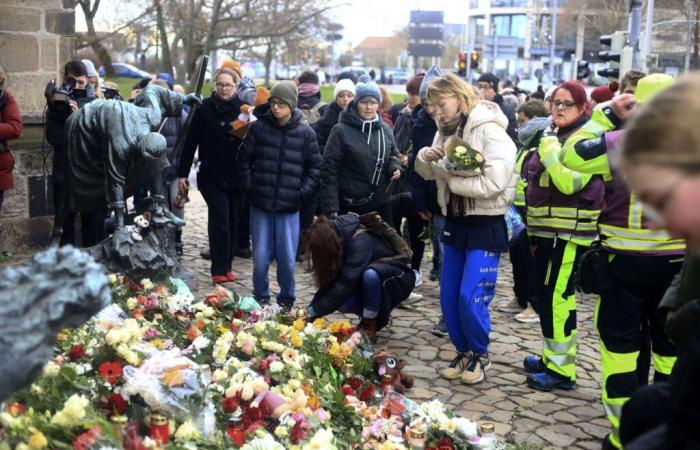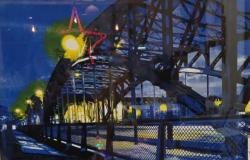According to authorities, the suspect in the car-ramming attack on a Christmas market was motivated by Berlin's asylum policy, in particular “the way refugees from Saudi Arabia are treated in Germany.”
An atypical profile. The Saudi suspect in the car-ramming attack on a Christmas market in Germany, which left 5 dead and 200 injured, is an “Islamophobe” probably wanting to protest against the insufficient protection, in his eyes, of refugees from his country by Berlin.
German authorities began on Saturday to shed light on the still-confused motivations of the alleged perpetrator of what Chancellor Olaf Scholz called a “terrible” and “crazy” act by meditating in the traumatized city. from Magdeburg.
The rest after this ad
The latest assessment of the mad race of the BMW vehicle knocking over the crowd at the Christmas market over 400 m is still only provisional. Among the injured, around forty are very seriously injured, to the point that there is reason “to worry” about them, the leader said.
The rest after this ad
“It seems that the crime could have as a background dissatisfaction with the way refugees from Saudi Arabia are treated in Germany,” local prosecutor Horst Walter Nopens told reporters.
At the same time, the German Minister of the Interior, Nancy Faeser, described the suspect, a 50-year-old Saudi doctor who had himself taken refuge in Germany since 2006 and was arrested Friday evening at the scene of the tragedy in his car, as “Islamophobic », in view of his public positions.
The rest after this ad
The rest after this ad
An “atheist”
Taleb Jawad al-Abdulmohsen, working as a psychiatrist in the region, presented himself in an interview with AFP in 2022 as “atheist”, which led him to flee his country where he claimed to have been “threatened with death for apostasy from Islam.
He had evolved in recent years on social networks towards a radical discourse, mixed with conspiracy, not hiding his sympathies for the theses of the extreme right against Muslim immigration.
In essence, he criticized the German authorities for not sufficiently protecting Saudis fleeing their country for religious or political reasons, and for being, conversely, generous towards Muslim refugees from the Middle East.
Last August, he wrote on his X account: “Is there a path to justice in Germany without blowing up a German embassy or randomly slitting the throats of German citizens? I have been looking for this peaceful path since January 2019 and I have not found it.”
“This is a psychologically disturbed person,” Taha al-Hajji, of the Euro-Saudi Organization for Human Rights (ESOHR), based in Berlin, told AFP.
Coming to Magdeburg in the east of the country on Saturday to comfort residents, Olaf Scholz launched an appeal for national cohesion, promising “to act against those who want to sow hatred”.
Political controversy
He called on the Germans to “stick together”, while the far right of the Alternative for Germany (AfD) has already seized on the attack to denounce the reception of hundreds of thousands of refugees in the country in recent years.
“When will this madness end? », wrote on the X network the co-president of the AfD Alice Weidel, whose party is credited with second place in the polls, at almost 20%, in view of early legislative elections at the end of February.
Several Magdeburg residents expressed their anger, with one loudly calling on the chancellor during his visit to “talk with the AfD” about welcoming refugees.
“When so many people come to us, we also have to look a little closer. We now pay the bill,” said another passerby, Michael Raarig, a 67-year-old retired engineer.
The city of Magdeburg is in shock by the images of the car-ramming attack. Among the five dead are a 9-year-old child and four adults. The injured were distributed to fifteen different hospitals.
Around 7:00 p.m. (6:00 p.m. GMT) on Friday, the powerful BMW car suddenly rushed into the aisles of the Christmas market.
Dressed in black, Mr. Scholz placed flowers on Saturday in front of the church, opposite the scene of the tragedy. Many anonymous people preceded him, leaving bouquets and candles, to bear witness to the fear which froze the country a few days before Christmas and in the middle of the electoral campaign.
The attack came eight years almost to the day after a similar act committed at a Berlin Christmas market. But as it stands, the authorities exclude any Islamist motivation, unlike that of Berlin in 2016.
Among the people, sometimes in tears, gathered on the porch of the Johannis Church, engineer Michael Raarig said he was “shocked”. “I never thought it was possible here,” he emphasizes.






